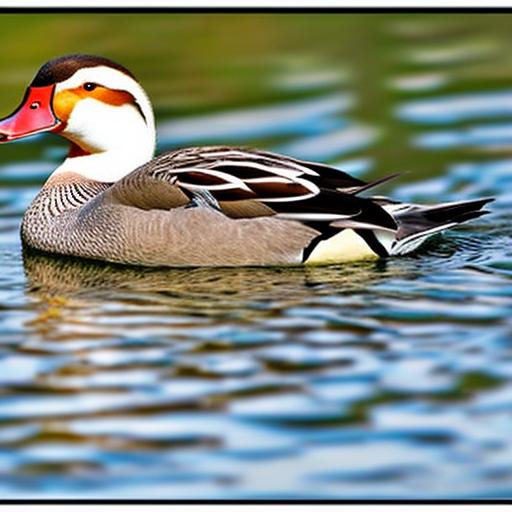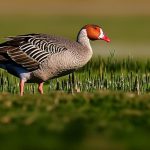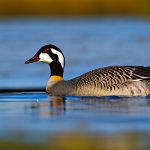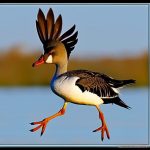Having ducks and geese landing on your dock can be a nuisance. Not only do they leave behind droppings that can be unsightly and difficult to clean, but they can also cause damage to your dock and surrounding areas. Understanding the behavior of ducks and geese is crucial in effectively preventing them from landing on your dock. By knowing their migratory patterns, feeding habits, and nesting behaviors, you can implement strategies to deter them from your dock.
Key Takeaways
- Understanding the behavior of ducks and geese can help you prevent them from landing on your dock.
- Identifying the reasons why ducks and geese are attracted to your dock is the first step in deterring them.
- Creating physical barriers, such as netting or fencing, can prevent ducks and geese from landing on your dock.
- Installing visual deterrents, such as decoys or reflective tape, can scare off ducks and geese.
- Using sound deterrents, such as loud noises or predator calls, can keep ducks and geese away from your dock.
Understanding the behavior of ducks and geese
Ducks and geese are migratory birds, meaning they travel long distances during certain times of the year. They typically migrate in the spring and fall, moving between their breeding grounds and wintering areas. Understanding their migratory patterns can help you anticipate when they are more likely to be in your area and take appropriate measures to prevent them from landing on your dock.
In terms of feeding habits, ducks and geese are primarily herbivores. They feed on aquatic plants, grasses, seeds, and grains. They are attracted to areas with abundant food sources, such as marshes, ponds, and lakes. Knowing their preferences can help you identify potential food sources that may be attracting them to your dock.
Ducks and geese also have specific nesting and breeding behaviors. They typically build nests near water bodies, such as lakes or ponds, using materials like grasses and twigs. They lay eggs in these nests and both parents take turns incubating them. Understanding their nesting behaviors can help you identify areas around your dock where they may be more likely to land.
Identifying the reasons why ducks and geese are attracted to your dock
Docks provide an appealing resting and feeding spot for ducks and geese for several reasons. Firstly, docks often provide a safe haven from predators as they are elevated above the water. This makes them an attractive spot for birds to rest and preen their feathers. Additionally, docks can provide a vantage point for birds to spot potential food sources in the water.
Another reason why ducks and geese are attracted to docks is the potential food sources they offer. Docks often have algae and other aquatic plants growing on them, which can be a source of food for these birds. Additionally, docks may have bird feeders or spilled food that can attract ducks and geese. Identifying these potential food sources can help you take steps to remove them and discourage birds from landing on your dock.
Creating physical barriers to prevent ducks and geese from landing on your dock
One effective way to prevent ducks and geese from landing on your dock is by creating physical barriers. Netting, fencing, and other structures can be installed around your dock to make it less accessible to birds. These barriers should be properly installed and maintained to ensure their effectiveness.
Netting can be used to cover the entire dock or specific areas where birds are more likely to land. This prevents them from accessing the dock and makes it less appealing as a resting spot. Fencing can also be installed around the perimeter of the dock to create a physical barrier that birds cannot easily cross.
It is important to regularly inspect these barriers and make any necessary repairs or adjustments. Birds are persistent creatures and may find ways to bypass or damage the barriers over time. By ensuring that the physical barriers are in good condition, you can effectively prevent ducks and geese from landing on your dock.
Installing visual deterrents to scare off ducks and geese
Visual deterrents can also be effective in scaring off ducks and geese from your dock. Scarecrows, balloons, and other objects that move or make noise can startle birds and discourage them from landing. It is important to change the location and appearance of these deterrents regularly to prevent habituation.
Scarecrows can be placed on or near the dock to create a visual deterrent. These can be made from old clothes stuffed with straw or other materials. Balloons can also be tied to the dock and allowed to move with the wind, creating movement that birds find intimidating.
It is important to regularly change the location and appearance of these visual deterrents. Birds can quickly become accustomed to their presence and no longer see them as a threat. By moving them around and changing their appearance, you can maintain their effectiveness in scaring off ducks and geese.
Using sound deterrents to keep ducks and geese away from your dock

Sound deterrents can be another effective method to keep ducks and geese away from your dock. Noise-making devices, such as air horns or sirens, can startle birds and discourage them from landing. However, it is important to use these deterrents sparingly to prevent habituation.
Air horns or sirens can be set up near the dock and activated when birds are approaching. The sudden loud noise can startle birds and make them think twice about landing on your dock. However, it is important not to overuse these deterrents as birds may become accustomed to the noise and no longer see it as a threat.
Using sound deterrents in combination with other methods, such as physical barriers or visual deterrents, can increase their effectiveness. By creating a multi-sensory deterrent system, you can significantly reduce the likelihood of ducks and geese landing on your dock.
Removing food sources that attract ducks and geese to your dock
One of the most effective ways to prevent ducks and geese from landing on your dock is by removing potential food sources. This includes bird feeders, spilled food, or any other items that may attract birds. By eliminating these food sources, you remove the incentive for birds to land on your dock.
If you have bird feeders near your dock, consider relocating them to a different area away from the dock. This will prevent birds from associating the dock with a food source. Additionally, be mindful of any spilled food or crumbs that may accumulate on the dock. Regularly clean up these spills to discourage birds from landing.
It is also important to properly dispose of any food waste or scraps. Ducks and geese have a keen sense of smell and can be attracted to food waste even if it is not directly visible. By properly disposing of food waste, you can further discourage birds from landing on your dock.
Keeping your dock clean and free of debris
In addition to removing food sources, keeping your dock clean and free of debris is important in preventing ducks and geese from landing. Birds are attracted to areas with debris as it can provide nesting materials or potential food sources. By regularly cleaning your dock and disposing of debris properly, you can make it less appealing to birds.
Regularly sweep or hose down your dock to remove any debris that may have accumulated. This includes leaves, twigs, or any other items that birds may find attractive. Additionally, be mindful of any nesting materials that birds may use, such as grasses or twigs. Remove these materials promptly to discourage nesting.
Properly disposing of debris is also crucial in preventing birds from landing on your dock. Avoid throwing debris into the water as this can attract birds looking for potential food sources. Instead, dispose of debris in designated areas away from the water.
Planting vegetation that ducks and geese dislike around your dock
Planting vegetation that ducks and geese dislike around your dock can be an effective long-term solution to prevent them from landing. Certain plants, such as cattails or tall grasses, are less appealing to birds and can act as a natural deterrent.
Cattails are aquatic plants that grow in marshy areas and are known to deter ducks and geese. Planting cattails around your dock can create a barrier that birds are less likely to cross. Similarly, tall grasses can provide cover and make it more difficult for birds to access the dock.
When choosing vegetation, it is important to select plants that are native to your area and properly maintain them. Native plants are more likely to thrive in your specific climate and provide the desired deterrent effect. Regularly trimming and maintaining the vegetation will ensure its effectiveness in preventing ducks and geese from landing on your dock.
Training your dog to scare off ducks and geese
Dogs can be effective in scaring off ducks and geese from your dock. Their presence alone can be enough to deter birds from landing. However, it is important to properly train your dog and ensure that it does not harm the ducks and geese.
Start by introducing your dog to the dock and gradually increase their exposure to birds. Use positive reinforcement techniques to reward your dog for staying calm and not chasing the birds. Over time, your dog will learn that the dock is off-limits to birds and will naturally deter them from landing.
It is important to note that not all dogs are suitable for this task. Some breeds have a strong prey drive and may be more likely to harm the ducks and geese. If you are unsure about your dog’s suitability, consult with a professional dog trainer or behaviorist.
Seeking professional help to manage duck and geese populations near your dock
If you are experiencing persistent issues with ducks and geese landing on your dock, it may be necessary to seek professional help. Wildlife control experts can provide guidance on managing bird populations in a humane and effective manner. They can assess the situation, recommend appropriate strategies, and ensure compliance with local regulations and laws regarding wildlife management.
It is important to follow local regulations and laws when dealing with bird populations near your dock. Some species of ducks and geese may be protected, and it is illegal to harm or disturb them without proper permits. By seeking professional help, you can ensure that you are taking the necessary steps to manage bird populations while staying within the bounds of the law.
Preventing ducks and geese from landing on your dock requires a comprehensive understanding of their behavior and implementing appropriate strategies. By creating physical barriers, installing visual and sound deterrents, removing food sources, keeping your dock clean, planting vegetation, training your dog, and seeking professional help when necessary, you can effectively prevent ducks and geese from landing on your dock. Taking action to deter birds not only helps maintain the cleanliness and integrity of your dock but also contributes to the overall well-being of these migratory birds.
If you’re looking for ways to keep ducks and geese off your dock, you might find this article on duck mating season from Poultry Wizard helpful. Understanding the breeding patterns and behaviors of ducks can provide insights into how to deter them from your dock effectively. Check out the article here for valuable information on duck mating season and strategies to keep these waterfowl away from your dock.
FAQs
What are some common problems caused by ducks and geese on docks?
Ducks and geese can cause a variety of problems on docks, including leaving droppings that can be slippery and unsanitary, damaging dock materials with their sharp claws, and making noise that can be disruptive to nearby residents.
What are some effective ways to keep ducks and geese off my dock?
Some effective ways to keep ducks and geese off your dock include installing bird netting or wire mesh around the perimeter of the dock, using decoys or scare devices such as motion-activated sprinklers or noise makers, and removing any food sources that may be attracting the birds.
Is it legal to harm or kill ducks and geese that are causing problems on my dock?
No, it is not legal to harm or kill ducks and geese that are causing problems on your dock without a permit from the appropriate wildlife agency. There are humane and effective methods for deterring these birds that do not involve harming them.
What are some natural deterrents that can be used to keep ducks and geese off my dock?
Some natural deterrents that can be used to keep ducks and geese off your dock include planting tall grasses or shrubs around the perimeter of the dock, using reflective surfaces such as mirrors or CDs to create a visual deterrent, and using natural predator decoys such as fake owls or hawks.
How can I prevent ducks and geese from nesting on my dock?
To prevent ducks and geese from nesting on your dock, it is important to regularly clean up any debris or vegetation that may be attracting them, install bird netting or wire mesh around the perimeter of the dock, and use scare devices or decoys to deter them from landing on the dock. It is also important to be aware of the nesting season for these birds and to take extra precautions during this time.
Meet Walter, the feathered-friend fanatic of Florida! Nestled in the sunshine state, Walter struts through life with his feathered companions, clucking his way to happiness. With a coop that’s fancier than a five-star hotel, he’s the Don Juan of the chicken world. When he’s not teaching his hens to do the cha-cha, you’ll find him in a heated debate with his prized rooster, Sir Clucks-a-Lot. Walter’s poultry passion is no yolk; he’s the sunny-side-up guy you never knew you needed in your flock of friends!







